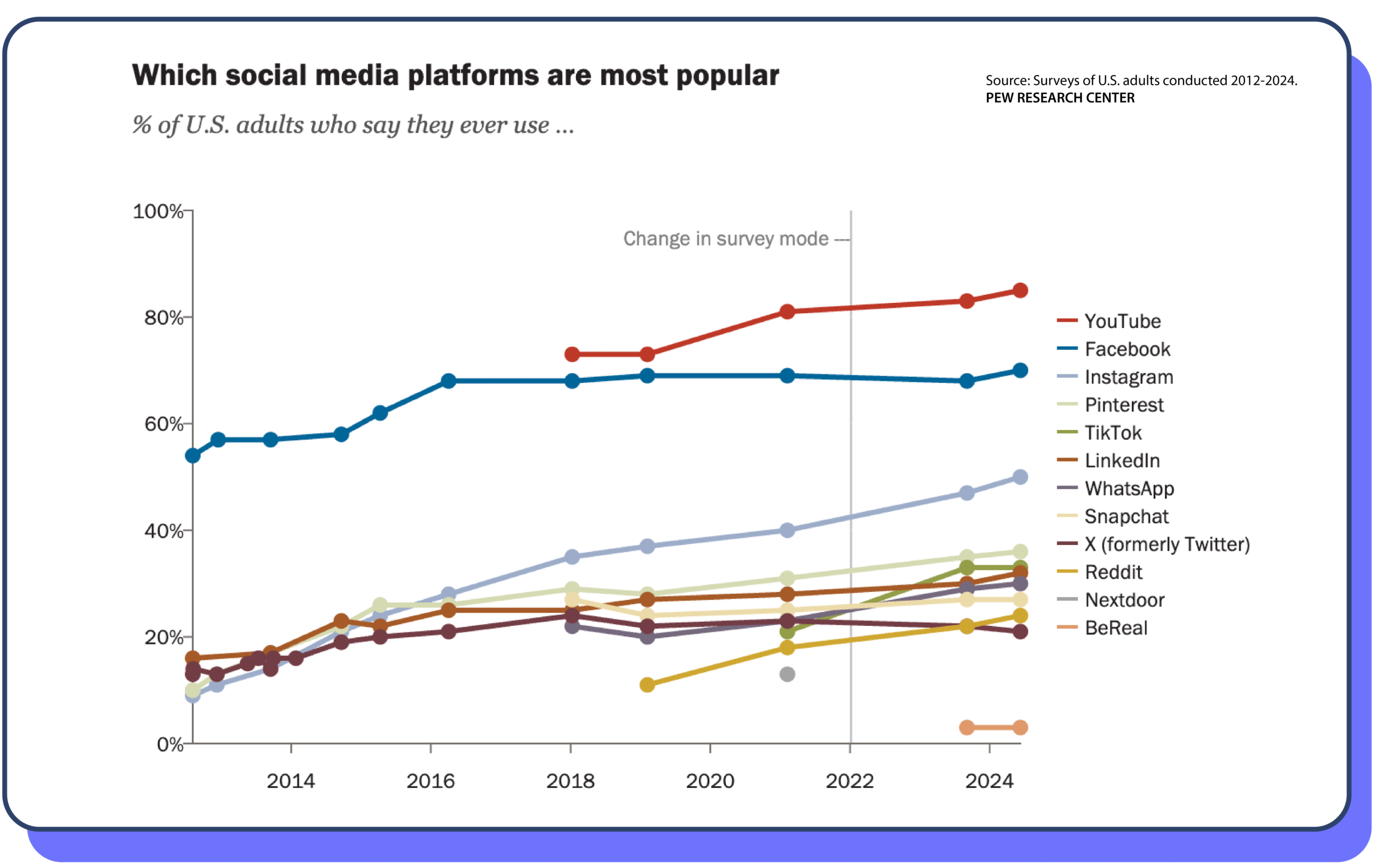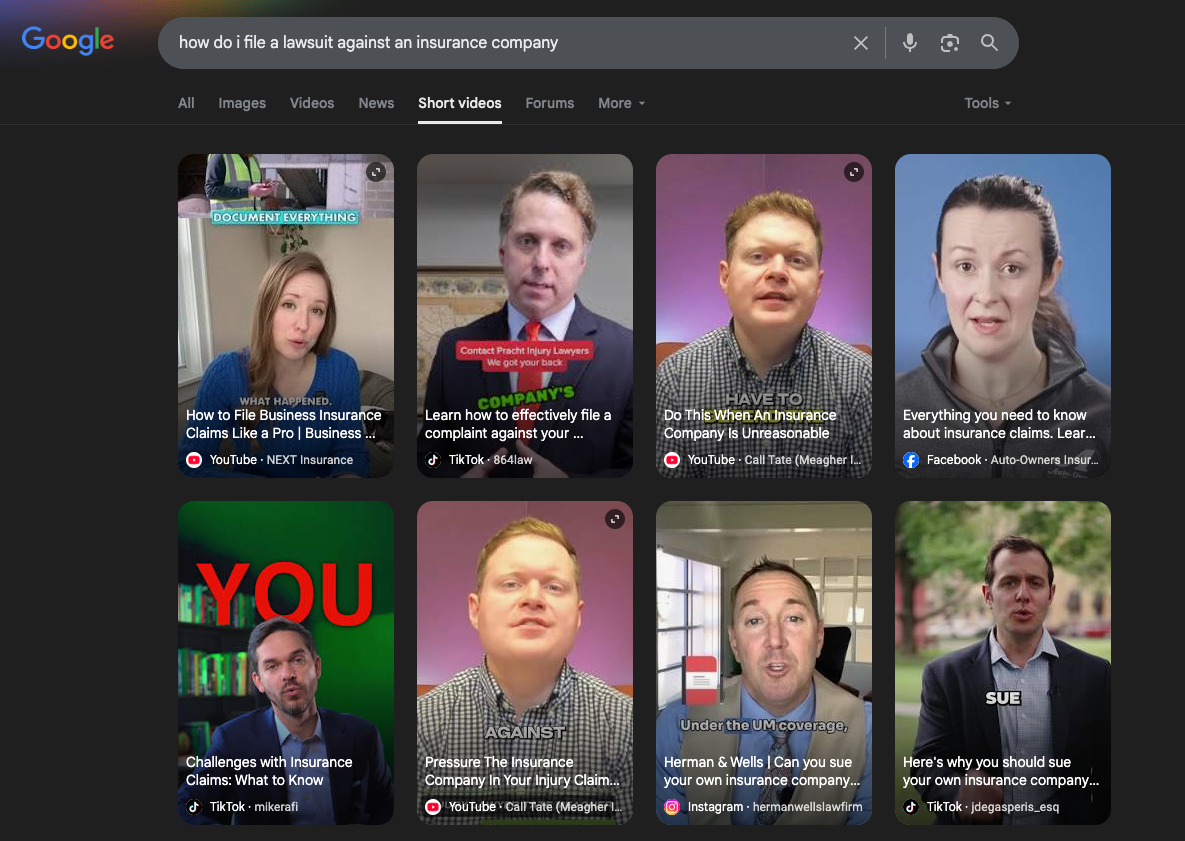“The biggest thing I hear is, “I feel like I know you”. I share about my life and sprinkle in law.”
(Quote from a lawyer in a private Facebook Group.)
This quote captures the value of making social media work for a law firm. Social media has transformed how law firms connect with their communities and build trust.
The three most important things I can share with you about making social media work for your law firm are:
Authenticity
Consistency
Value
People hire lawyers whom they know, like (sometimes), and trust. The likelihood that social media will “work” for your law firm will depend heavily on your ability to create content that resonates with people likely to refer clients and hire you.
Who are you?
“Be yourself; everyone else is already taken.”
― Oscar Wilde
You might be thinking, “Huh? Why does this matter for social media?”
Answer: If you don’t know who you are, why you do what you do, and why it matters for clients, why would anyone else?
Your mission, vision, values, interests, and “uniqueness” are the very things that make social media work. They’re the “I feel like I know you” from the quote above. They should shape your entire social media strategy. And although it might feel like it sometimes, you’re not JUST a lawyer. For social media to “work,” you must be willing to be social!
That means being vulnerable. It means being transparent. It means sharing your life experiences. And it might just be the most challenging part for you. I see too many lawyers and law firms posting generic content:
Stock holiday messages.
Generic “legal” images.
Obvious AI sludge.
Are you moved to engage, comment, and share this stuff when you see it on other people’s profiles? Lawyers who effectively use social media for their law firms tend to share who they are.
You might wonder, “But I might not appeal to everyone.” That’s the whole point! By sharing who you are, some people will gravitate to you. The marketing folks call it “affinity.”
This is one of the most critical aspects of marketing, more generally, and particularly important in the social media context.
How often and where?
“Trust is built with consistency.”
― Lincoln Chafee
Lawyers regularly ask me:
How often should I post?
What time should I post?
Where should I post?
Answer: 🤷
In a world of limitless resources, multiple times per day across the platforms your referral sources and clients engage with the most. Of course, we don’t live in that world.
I will share that many lawyers who are successful with social media post daily. You see, people generally don’t care about you. They care about themselves. Referral sources forget about you. Even people who love you will forget about what you do at the key moment of making a referral.
Also, remember that not everyone you’re connected with sees all of your posts. For social media to work for your law firm, show up somewhere every day.
Here are some tactical tips:
Listen: The people you’re connected with tell you what they think of your posts. Listen to what they tell you through engagement, comments, and sharing. They tell you something with their silence.
Test: Try different post types and times. Do you see patterns? Unsurprisingly, engagement ebbs and flows throughout the work day. Try scheduling posts early in the morning, around lunch, and in the evening. Experiment with weekend posts. Share “stuff” from your life and sprinkle in your expertise.
Platform Culture: Each platform has its features, customs, and norms. Duplicate content might go viral on one platform and get zero engagement on another. I encourage lawyers to post natively rather than automate cross-posting. Tags, hashtags, and other social features are lost via automation.
For “where to publish,” go back to: Where are the people most likely to be referral sources and clients spending their time?
Statistically speaking, they’re probably on:
YouTube
Facebook
Instagram
TikTok
LinkedIn

Pew Research Center Social Media Fact Sheet
Of course, your audience and community may vary. Prioritize the platforms that friends, family, colleagues, and clients frequent.
Pro tip: Research the intersection between social and search.
For example, look at these Google results for: How do I file a lawsuit against an insurance company?


As you can see, Google surfaces forums and social media content directly in its results. Research which platforms have visibility for relevant local search queries. Prioritize these platforms as they’re likely to deliver visibility with people who aren’t already familiar with you. These tend to be:
YouTube
Instagram
Reddit
Quora
LLMs rely heavily on these sites (i.e., ChatGPT, Perplexity, etc).
An effective social media presence can raise a law firm’s profile, engage potential clients, and generate new business. I have seen firsthand how consumer-facing law practices (especially personal injury, family law, and criminal defense firms) can leverage social platforms like Facebook, Instagram, LinkedIn, TikTok, and even Reddit to build their brand and attract clients.
What About Social Media and AI?
Can you use AI to share your life, sprinkle in law, and give folks the feeling that “they know you?” If so, by all means, use AI!
Unfortunately, that’s not what I see out there. Instead, I see AI-written posts and comments that do the opposite. Instead of sharing real-life that helps me get to know the person, they make it easy for me to ignore, or even worse, block the person.
Full disclosure: I use AI.
I used it to help me write this post. It helped me:
Find social media data and research.
Dig deeper into the issues law firms face in using social media.
Fix some of my bad writing.
Hopefully, it didn’t detract from your experience in reading it.
Using Social Media to Deliver Value
Legal services may be a serious business, but potential clients are still regular consumers—66% of legal clients do online research (including checking websites and social media) before hiring an attorney.
Potential clients often expect to find a law firm on Facebook or see its attorneys on LinkedIn, just as they would a restaurant on Instagram. The 2023 American Bar Association Tech Report found that 31% of lawyers have directly acquired new clients through social media, and many more say that social media is an essential channel for building initial trust and awareness.
Consumer-facing law practices—like personal injury, family law, and criminal defense—are particularly well-suited to social media marketing. These practice areas serve individual clients who often turn to the internet for help when a legal need arises.
Here are some ideas for delivering value:
Personal Injury Law
Utilizing a storytelling approach on Facebook, such as sharing client testimonials (with permission) and explaining legal steps in plain language, helps humanize the firm and build trust. PI firms also frequently showcase community involvement (charity events, safety awareness campaigns, etc.) to signal that they care about people, not just cases. Even platforms like TikTok have proven effective for personal injury lawyers: Attorneys who provide quick legal tips or entertainingly debunk insurance tricks can gain massive followings.
For instance, California attorney Mike Mandell—known as “Law by Mike” has amassed millions of TikTok followers by delivering legal education in a fun, relatable style, making him arguably the most famous lawyer on social media. That kind of reach dramatically expands a PI firm’s brand recognition.
Family Law
Firms handling divorce, custody, or other family matters must approach social media with extra sensitivity and support. Content that is compassionate and empathetic resonates with people going through emotional situations. A family law practice might share articles or videos on co-parenting tips, explain how mediation works, or post encouraging messages for those in difficult times. Facebook and Instagram can be ideal for creating a sense of community.
For example, hosting live Q&A sessions about common divorce questions or posting inspirational quotes about starting fresh. It also effectively highlights the firm’s involvement in local family-oriented events or charities (like school supply drives or domestic violence prevention campaigns). Such posts show that your attorneys are invested in the well-being of families in the community, not just legal fees.
Criminal Defense
Criminal defense attorneys often use social media to demonstrate their expertise and results, since potential clients facing charges want a lawyer who is knowledgeable and tough. On platforms like Twitter (X) or Facebook, a defense firm might share quick legal tips about rights during a police encounter, comment on high-profile criminal cases in the news to showcase thought leadership, or highlight notable victories (e.g. dismissals or acquittals) the firm has achieved. Engaging in conversations about criminal justice issues can also build credibility.
For instance, a lawyer might participate in relevant Reddit discussions (such as an AMA—“Ask Me Anything”—on r/legaladvice) to answer general questions, carefully clarifying it’s not specific legal advice. This kind of interaction can position the attorney as a trusted expert. The tone for criminal law content should remain professional and authoritative; humor is used more cautiously here, but authenticity and clarity are key to connecting with those who need help navigating the justice system.
No matter the practice area, the common thread is providing value and approachability. Law is complex and often intimidating. Social media is where a firm can break down that barrier by communicating in a friendly, accessible way. The most successful legal social accounts don’t just advertise “Call us for a free consultation!” Instead, they educate, empathize, and engage the audience. By doing so, those firms stay top-of-mind so that when someone eventually does need legal help, they already feel like they know and trust you.
Measuring Social Media for Your Law Firm
Lawyers ask, “How do I measure social media investments?”
It’s a valid question. Unfortunately, too many have a myopic view of measurement.
First, marketing people have trained them on “last click attribution.” Put simply, this is a way to credit the last action someone has taken before they contact you. For example, your data might show that someone clicked on a link to your website from a Facebook post, contacted and hired you. It’s great when this happens, but it doesn’t tell the whole story. Why were they connected with you? Why did they click? How many other touchpoints did they have with your firm before they contacted you? How would they answer the question: “How did you hear about us?”
Don’t limit your measurement of social media to last-click attribution. You’ll likely conclude that “social media doesn’t work.” Trust me, it’s not social media…
Second, implement mandatory qualitative intake data. Ask people how they heard about you or who referred you. Don’t fret about whether they get it wrong. You’re not looking for 100% accuracy. You’re looking for signals and trends about what comes to mind when people think about you. Even if your last click data says “Google organic,” if they self-report that a LinkedIn post resonated with them, give that post credit!
Finally, recognize that legal services journeys are not always linear. Your next clients will likely engage with you across various platforms and media. Let their feedback be your guide. I talk to too many lawyers who have been persuaded that social media isn’t working for them, only to learn that it was one of their most significant sources of business. It wasn’t social media; it was how they kept score.
Curious about how to make social media work for your firm? Join me at AffiniPay’s Kaleidoscope event this September, where I’ll be diving into strategies that can elevate your online presence. I’d love to see you there!
About the author

Gyi TsakalakisLegal SME
Gyi Tsakalakis helps lawyers grow their practices online. As a non-practicing lawyer, Gyi is familiar with the unique considerations of ethically and effectively marketing a law practice online. He founded AttorneySync to provide lawyers with more effective, transparent, and accountable digital legal marketing results. He proudly serves as a Co-Chair of ABATECHSHOW 2023 and hopes to see you there. He is passionate about Michigan football, coffee, and stoicism.
